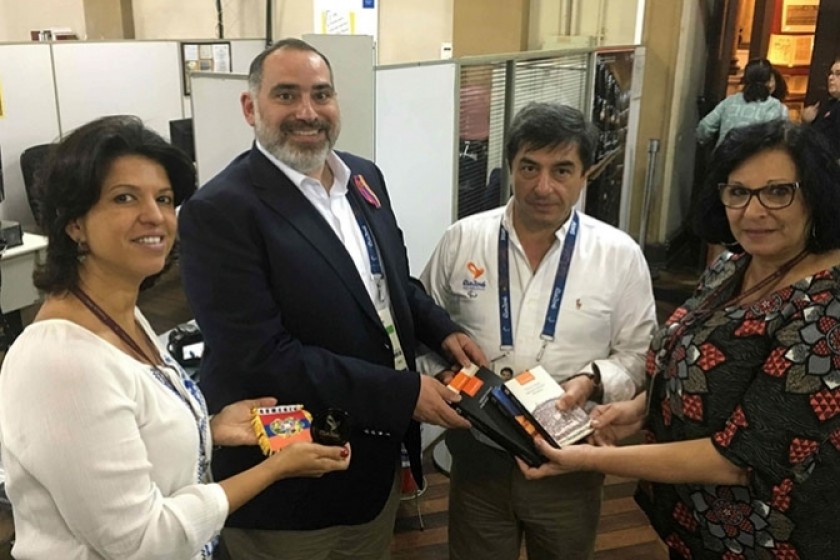
London-Armenian Businessman: “If a tree is rotten from the roots, chop it down”
By Naira Hayrapetyan
Raffi Danielian says there are two sets of laws in Armenia - the bane of many diaspora business ventures
During my conversation with Raffi Danielian, a businessman from London, he tells me about the successful investments he’s made in various sectors.
Danielian says he’s always wanted to invest in Armenia, but adds, “I don’t want to.”
The reason is simple. He, like other numerous diasporan entrepreneurs, doesn’t want to see his investments fail. They would fail because Danielian believes that there are other, hidden laws, in Armenia that are much more entrenched than the laws on the books. He doesn’t want to be subjected to those laws.
“You have to pay this tax, that tax. You must give something to this guy in order not to pay a new tax. Give a gift…,” says Danielian, adding that laws exist throughout the world and must be complied with. However, when one understands that those laws are applied according to some hidden traditions that seize your investment before your eyes, everything else is meaningless.
“There’s a list of laws. Fine, I have to comply, even though I might have some reservations. But when you follow these laws, you suddenly find yourself in an unexpected situation. It seems you can circumvent these laws if you leave something for this or that person. It’s then that other laws kick-in,” says Danielian about how things are done in Armenia.
Danielian believes that the problem isn’t only the mechanisms of government, but the prevailing mentality as well.
Years ago, the Danielian family opened a large company in Armenia. Raffi Danielian’s father owned a large computer firm in London that serviced different countries in Europe. The family started business dealings, in the same vein, with Armenia back in the Soviet era. Raffi says that everything changed once Armenia became independent.
The family’s company in Armenia was robbed and seized. Their confidence in Armenia was lost.
“I understand that Soviet Armenia and independent Armenia are two different entities. I can also accept that the transition phase was probably different. But, in the past years, I have seen and heard numerous examples that speak to the same thing. The business projects of many diasporan Armenian entrepreneurs have failed here. They simply left the homeland,” says Raffi Danielian.
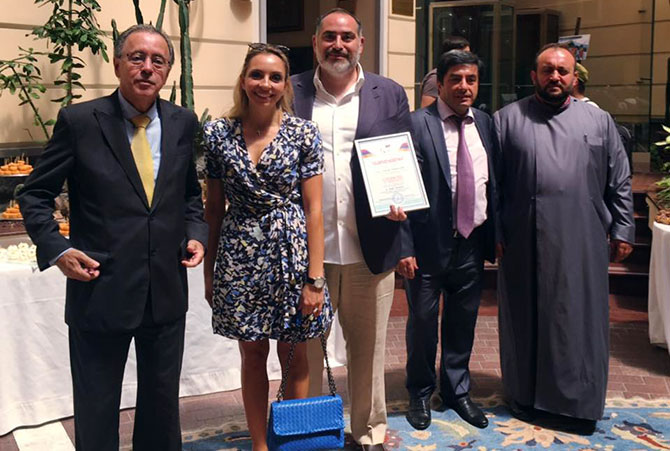
Alice and Raffi Danielian (2nd from left)
Luckily, Raffi still wants to help in Armenia. Even from afar, Raffi follows developments in Armenia and understands that there are people here, removed from the system’s mentality, facing many problems. While Raffi doesn’t like to talk about his assistance, describing it as a small thing, I confirm that he supports the Pyunik Armenian Association for the Disabled. Raffi particularly helps the association participate in the Paralympic Games. Raffi joined the association at this year’s games in Brazil. Raffi also closely follows the plight of Syrian-Armenian refuges. He tries to assist them in more practical and specific ways.
“Do you see this sports field,” Raffi asks, pointing to the football pitch next to the Pyunik building. “I heard a half a million dollars was allocated, from various sources, to build. That’s not the problem. A quality field can demand a large investment. The problem is that this building, where Armenian children, those with disability issues visit, doesn’t have adequate resources to operate.
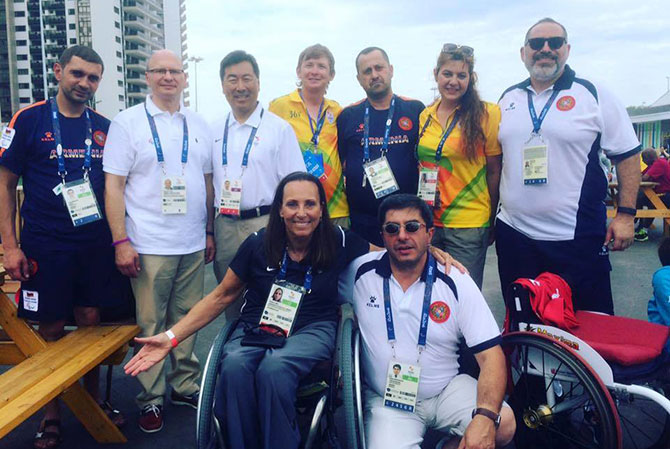
Raffi and his family spent their 2016 summer holiday in Armenia. His wife Alice says the family always vacationed in Europe but now, since their children have grown up, they wanted them to visit Armenia more frequently, in the hope that the children would feel a greater attachment to the country.
“We are lucky to be surrounded with Armenian friends in London. We frequently get together and organize events. Our children are exposed to an Armenian environment. They hear the language and speak it. We don’t have to force such things on them,” says Alice, adding that a totally different set of emotions are experience when a child personally searches or discovers their history, something related to their national identity.
“The homeland isn’t something imagined. We’ve been instilled with the sense of the homeland since childhood. It’s been with us our entire lives, in our heart and mind. Even without seeing it, each of us, inside, has carried that idea and realized that our roots are here, no matter where one is born. At the same time, however, we’ve been living far away from it for several generations. It wasn’t my decision to be born far away. They kicked us out from our home. My grandfathers gave their lives to save their Armenia. But those who survived the massacres were forced to restart their lives scattered far from home. I get angry that we are not here. But I get even angrier because I find it hard to picture myself here permanently. Do you understand? I and others of my generation have, it seems, been split into several parts; there, here.”
“But the homeland isn’t just the country,” Raffi adds to what his wife just said. “It’s the people. None of my family is from Yerevan. They came from Adana and Kayseri. But when I listen to songs about Yerevan, I get emotional and cry. We visited the Sardarabat Museum. I was amazed by the exhibits I saw there. They’re our cultural treasures. I wonder why we don’t show all of this to tourists visiting Armenia, rather than taking them to Sevan or Garni all the time.”
During the summer, the Danielian family rushed about, trying to visit as many interesting sites as possible – museums, concert halls, cultural institutions, cafes. The parents wanted to experience as much as possible, and to have their children do the same. The family also travelled outside Yerevan, visiting several villages in Armavir Province.
“Wherever we went, our impressions were lovely,” says Alice. “Yes, it was clearly apparent that people have many concerns and that the problems are huge. But this doesn’t stop them from being openhearted. Wherever we went, we left with a sense of pride. Many complained about their lives, but I observed that everyone was happy within the folds of the family, with their children and grandkids.”
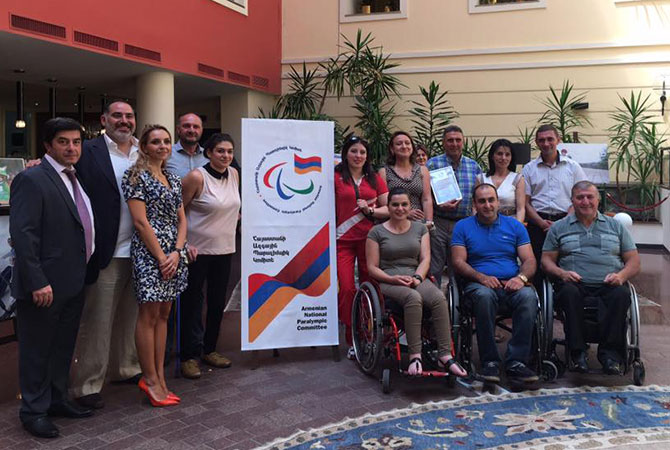
When the Danielians were planning to visit Armenia in July, friends advised them to postpone their trip. The situation on the ground was tense and dangerous, the family was told.
“I noted, however, that the people saw things differently,” says Raffi. “When we arrived, I again was convinced that the reality was different. People were peacefully protesting. They were out in the streets because the life they were living was no longer tolerable. They wanted to change it.”
At the time, the foreign press is full of stories regarding what was taking place in Armenia. Raffi and Alice say that trying to follow events from afar isn’t easy. Oftentimes, given no other option, one goes along with the opinions of others, depending on the source and the degree to which they are professional in their coverage.
“Following several prominent English-language new outlets, as well as some part organs, it was difficult to grasp what was happening,” says Alice. Following the social networks, we realized that those people, who were described as terrorists, were supporters of the people. We know that terrorists operate differently. It was evident that the people sympathized with those rebellious guys. Perhaps the cup of tolerance was full. What we saw the police doing to the people and to reporters was totally different than what was being reported. In Europe, if you say you are a reporter, the cops calm down. Here, if you have to be afraid to say that…so forget about freedom of speech. Later, everything got muddled and we never understood where it took us. They acted, it was over, but nothing changed.”
“We have this problem. We don’t always want to openly talk about our mistakes,” adds Raffi. “We’re concerned that non-Armenians might see too much. Thus, it’s better to hide things rather than speak about them. This is wrong. You have to talk about problems, to make them visible, to solve them.”
Raffi’s family works with the Armenian General Benevolent Union (AGBU). His grandfather was involved in its founding. Alice, inheriting her family’s tradition, also became a member. While she has her set ideology, she doesn’t like the competition that exists between various parties and organizations in the diaspora and the problems that arise. Alice likes the fact that Archbishop Hovagim Manougian, the new primate, is trying to steer the community away from past divisions and to work as one.
Raffi says that at official meeting in Armenia, one hears the traditional refrain – “We need money”.
“Yes, I agree. There are many problems in Armenia and there’s a need for money everywhere. But you know, the diaspora also needs money. We maintain schools so our kids stay Armenian. We open various organizations and foundations to keep the communities interconnected. We operate churches and carry out numerous projects. How do we do it? Believe me, it’s gotten much harder. The diaspora faces many issues. On top of it all are the problems facing Armenia. They pain us even more.”
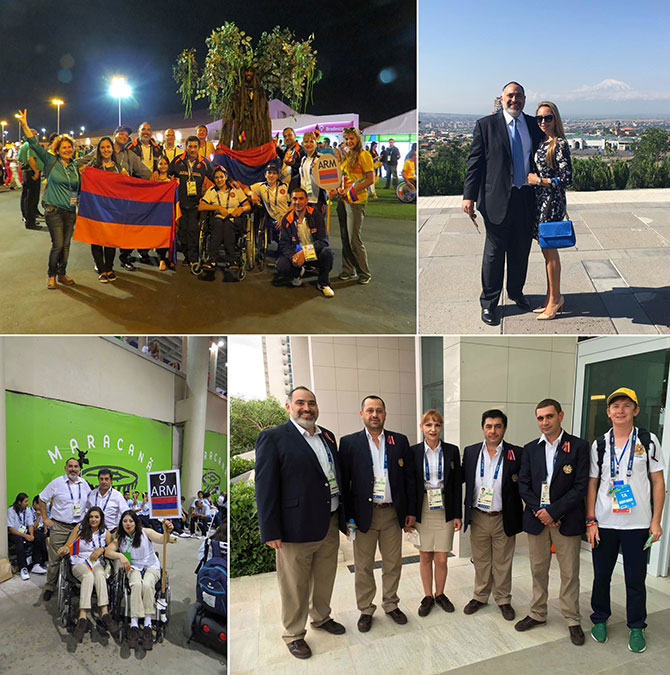
“If a tree is rotten from the roots, chop it down. Today, all we are doing is removing dried leaves,” says Raffi. “The problem is that we don’t have the right to get involved in many issues, since we don’t have the right to participate in elections. But we see that many things in Armenia are going in the wrong direction. The people patience is at an end.”
When it comes to the socio-economic situation in Armenia, Alice and Raffi don’t see eye to eye. Alice is critical. Raffi agrees it’s bad, but sees extenuating circumstances.
“The same problem exists in many countries,” Raffi argues. “I visited Latvia. All the men were working outside the country, like in Armenia. Travel two hours outside London and you’ll see the hardships people face. Such a system isn’t only a problem for Armenia.”
“But the government there assists the people, providing lodging and work opportunities. And here? Must the people suffer because the government isn’t doing its job?” Alice retorts.
Both see a lack of small business in Yerevan, despite the city’s superficial allure. They believe such businesses should have skyrocketed these past few years.
“If you visit Russia or China, you’ll see a middle class. Not here,” says Raffi. “People are either very poor or very rich. I find this amazing. Someone who wants to start a business opens a restaurant. That’s great, and it’s tough work. But where’s the other small businesses? I would be happy to devote time to impart my business knowledge to others. An exchange of experience, advice, to new business owners. I have an idea, a concept, but how to make it work. Providing such support, for me, is more important than sending money and never knowing where it’s gone.”
The bright spot for Raffi, in Yerevan, with all its problems and unpredictable future, are the young people. Raffi says his nephew amazes him with his knowledge of various languages and his willingness to boldly go forward. Raffi says he’s ready to collaborate with the new generation; to lend them a helping hand.
“April revealed a lot about us, and should serve as a lesson for us all,” says Raffi. “It was one of our history’s most tragic pages. First, it alerted us to the fact that the war continues and can enter your house at any moment. It also made us aware that there are people who sat down through it all, looking at each other’s’ faces. We found out that pour soldiers had no weapons. That’s crazy. I don’t know. Perhaps we need much more time to get our act together.”
(Fighting along the Artsakh-Azerbaijan border in April 2016 resulted in hundreds of deaths and wounded on both sides)
As we say our goodbyes, Raffi wants to dissuade me from writing about our conversation, arguing that he hasn’t said anything new.
“If you want to do something nice, write about the plight of these kids with disabilities and the Pyunik Association. Write about how concerned individuals are doing all they can to organize the correct rehabilitation for those with physical and mental issues, so that the children lead healthy and spiritually peaceful lives.”
I promise to do so. In the meantime, I must also raise the issues broached in our conversation. As Raffi points out, you have to talk about problems, to make them visible, to solve them.
Photos: Raffi Danielian’s collection and the Pyunik Armenian Association for the Disabled Facebook page.
 Videos
Videos Photos
Photos




Comments (4)
Write a comment